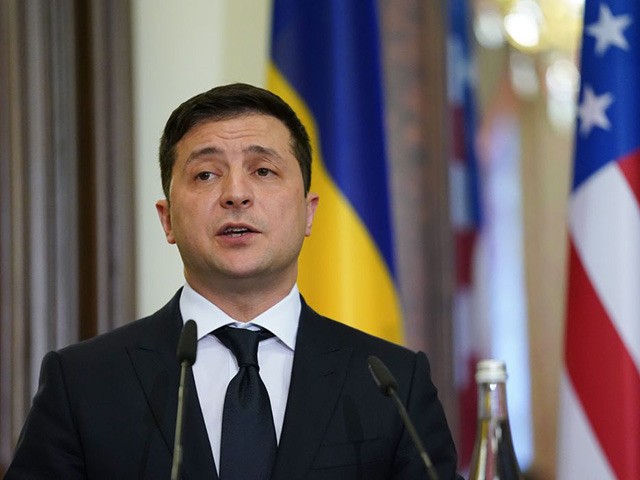A Chinese company called Beijing Skyrizon Aviation Industry Investment announced a $4.5 billion lawsuit against the Ukrainian government on Monday, posing a significant legal and financial menace to Kyiv even as Russian military pressure builds along the eastern border.
“Chinese investors have suffered significant losses both in Ukraine and in China as a result of the unfair treatment by Ukraine against Chinese investors over the past five years and the continuing implementation of illegal measures,” Skyrizon said when requesting a judgment from the Permanent Court of Arbitration in the Hague.
The Chinese company was referring to the Ukrainian government’s decision in March to effectively nationalize JSC Motor Sich, a Ukrainian firm ranked as one of the world’s largest producers of missile, helicopter, and jet engines.
Motor Sich grew so large because it was a major element of the Soviet Union’s war machine, especially its military helicopter fleet. The company continued selling equipment to Russia until 2014 when Russian support for separatists in eastern Ukraine and Moscow’s annexation of the Crimean peninsula prompted the Ukrainian government to ban military exports to Russia.
The export ban did considerable damage to Motor Sich’s business model. Three years later, Skyrizon led a group of Chinese investors to make a $3.6 billion offer for the firm.
At the urging of the U.S. government, Ukrainian courts froze the acquisition deal in 2018, then opened an antitrust investigation that kept it frozen for three years.
The Ukrainian national security council killed the deal for good in March by advising the state to take control of Motor Sich, so it could be “returned in the near future to the Ukrainian people, to the ownership of the Ukrainian state in a constitutional way,” as security council secretary Oleksiy Danilov put it.
The Chinese government cried foul, and Skyrizon immediately vowed to file legal challenges. In January 2021, the Trump administration designated Skyrizon as a “military end-user” for the Chinese People’s Liberation Army (PLA) and added it to a blacklist. Ukraine quickly followed suit and froze Skyrizon’s assets.
Ukraine generally has positive relations with China. The two countries, in fact, grew substantially closer during the Biden administration, as Ukraine signed huge cooperation deals for infrastructure projects with China, publicly thanked the Chinese for coronavirus vaccines, and withdrew from the U.N. Human Rights Council’s demand for an independent investigation of Chinese human rights abuses against the Uyghurs.
Some Ukrainian officials said China threatened to cut off vaccine shipments if Kyiv did not withdraw from the U.N. joint statement on the Uyghurs. Others warned the U.S. to put more effort into cultivating Ukraine’s friendship if it wanted to keep the country out of China’s orbit.
“My main message would be: If the West keeps surrendering Ukraine’s interests for a friendship with Russia, Ukraine may turn to the East,” warned Oleksiy Arestovych, an adviser to Ukrainian President Volodymyr Zelensky, in July.
China’s state-run Global Times crowed on Tuesday that Skyrizon’s suit would force Ukraine to “pay a price for targeting Chinese firms at the U.S.’ behest.”
The Global Times hooted that Ukraine is about to suffer the consequences for dancing to Washington’s tune, and the $4.5 billion claim by Skyrizon could be just a taste of the suffering to come:
Evidently, a major reason behind the impeded cooperation between Skyrizon and Motor Sich is that the US, which has been obsessed with undermining technological cooperation between China and other countries, had exerted pressure to scuttle the deal.
While Ukraine has always showed interest in economic cooperation with China, it seems to be more inclined to side with the US on certain deals. It also shows that geopolitical calculations could prompt Ukraine to sacrifice the interests of Chinese companies in exchange for Washington’s support. That means the Motor Sich case may not be the last as the country may target other cooperation projects at the US’ request.
However, Ukraine’s politicization of normal commercial cooperation would also deal a fresh blow to its already ailing domestic economy. The country is already in an extremely complicated geopolitical environment. Once its government set a precedent of shoehorning geopolitical factors into the economic sector, who would dare to invest in Ukraine?
The Global Times’ reference to an “extremely complicated global environment” alluded to the growing Russian military threat on Ukraine’s border, making the editorial into a threat that Zelensky had better start currying some favor with China if he wants its protection against Vladimir Putin.
The Biden administration on Wednesday urged Russia to de-escalate by pulling its troops back from the Ukrainian border and threatened punitive sanctions if Russia invades.
“Should Russia follow the path of confrontation, when it comes to Ukraine, we’ve made clear that we will respond resolutely, including with a range of high impact economic measures that we have refrained from pursuing in the past,” said Secretary of State Antony Blinken, speaking from Riga, the capital of Latvia. He did not specify what the sanctions might entail.
The Kremlin responded that it cannot de-escalate because Russia faces an imminent military threat from Ukrainian forces deployed in the Donbass region to fight separatists, a claim Ukrainian Foreign Minister Dmytro Kuleba dismissed as preposterous.
“I would like again to officially state that Ukraine does not plan any military offensive in Donbass. This is Russian propaganda nonsense in order to cover up Russia’s own preparations for a potential attack,” Kuleba said.

COMMENTS
Please let us know if you're having issues with commenting.